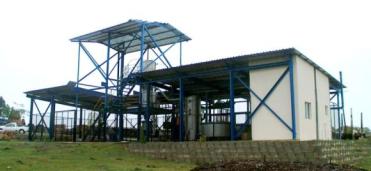South African Workshop Presentations
Two Visibility Workshops have been held on the 28 – 30 January 2010 and 2-4 March 2011 and a Partner & Training Workshop on the 15 – 22 March 2013.
2.1 Abstracts of South African Workshop (January 2010)
2.1.2 A CDM Perspective on Cogeneration in South Africa

Presenter:
Alistair McMaster:
The Clean Development Mechanism (CDM) under the Kyoto Protocol has provided the opportunity to improve the viability of renewable energy, including biomass and biogas cogeneration projects, in developing countries. Of the 4734 CDM projects registered or at validation by November 2009, 112 are from Africa and 28 from South Africa. Given the South African national GDP, this represents a disproportionately low number of projects.
In this presentation, cogeneration and its associated challenges in South Africa is considered in the context of CDM projects.
An overview and assessment of cogeneration projects is given, with reference to technology and technical issues; institutional Issues; enabling policy; environmental authorisation; and the rigours of the CDM process.
ESKOM definitions and classes of Cogeneration projects:
- Type 1: Projects utilizing process energy which would otherwise be underutilized or wasted.
- Type 2: Primary fuel based generation projects which produce, as part of their core design, other usable energy in addition to electricity.
- Type 3: Renewable fuel based projects, where the renewable fuel source is both (i) a primary source of energy used for generation and (ii) a co-product of an industrial process
Why so few co-generation based CDM projects in South Africa?
- Technology Issues
- Financial Issues
- Institutional Issues
- Regulatory Issues
- EIAs
- Rigorous CDM Process
- Apart from renewable solid biomass, cogeneration has been excluded from REFIT I and II
Technology Issues:
- No CC gas/steam turbines manufactured in South Africa (?).
- To date most IC gas engines are imported, but are expensive given current electricity prices, may not be appropriate for local conditions; and after sales service and support can be an issue.
- Locally produced hardware has yet to reach maturity, but promising future (also expensive).
- Limited supporting technology (flaring systems, continuous monitoring systems, remote field stations) and few integrated modules.

General Lessons Learned (Financing)
- Public Finance:
- Highly bureaucratic and plenty of red tape;
- Staff often have limited capacity to assess projects;
- Problem complicated by high staff turnover, which often means that applications go back to square 1;
- Each application must go through tiers of committees;
- Decision by the agency can take up to two years.
- Private Finance:
- More easily accessed, but high cost of borrowing
General Lessons Learned (Institutional)
- Issues around Power Purchase Agreements;
- No codes and standards for grid tie-in and transmission/wheeling agreements. Very poor enabling environment;
- Regulatory environment for Independent Power Producers is still in infancy; NERSA appears to be feeling its way;
- To date, Eskom has been both player and referee (Renewable Energy Purchasing Agency (REPA) housed in Eskom); and
- Electricity in South Africa has traditionally been cheap, while REFIT still to be rolled out.
- All eyes on Independent System Operator (ISO)
NERSA Licensing Requirements – a laborious process
- NERSA permits IPPs to sell power directly to entities willing to buy renewable energy outside REFIT, provided that a generation license has been granted.
- EIA – Record of Decision.
- Power Purchase Agreement.
- All other commercial agreements: Fuel Supply Agreement (FSA); Transmission Connection Agreement (TCA); and Transmission Use of System Agreement (TUOSA).
- Confirmation of inclusion in IRP/Ministerial approval for plant.
- Financing arrangements.
- Business Plan.
Rigours of the CDM Process
- To date CDM has been a complex process which is difficult to navigate, and involves significant financial risk.
- 40% of applications are rejected after large amounts of money have been spent.
- Issuance is often not successful.
- Uncertainty about post 2012 means high financial risk.